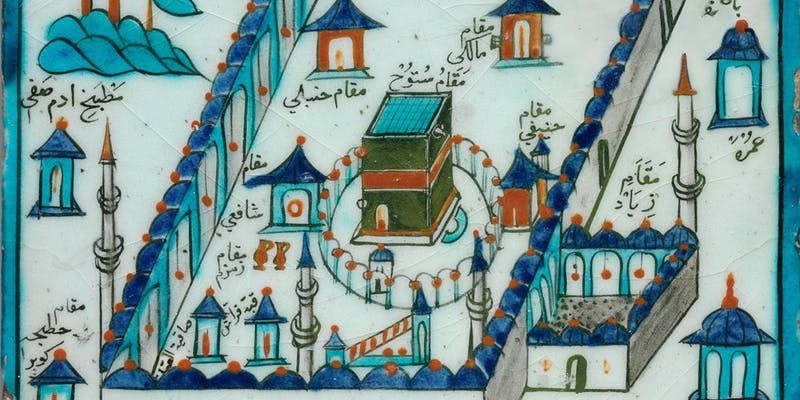Please join Dr. Avinoam Shalem, Riggio Professor of the History of the Arts of Islam and co-director of the Center of the Study of Muslim Societies (CSMS) at Columbia University, for a talk on visions of the Haram of Mecca.
The “Sacred” and the “Holy” (haram in Arabic and, to some extent al-muqaddas), are Semitic words denoting the act of separation, parting, or setting aside, and imply the apparent human faculty of setting distinctive borders between holy and profane zones. Constrained to time, these spaces become chronotopes. But, whereas the sacred space appears as totally autonomous and linked to the eternal, the profane zone seems to exist as bound to historical time. This supposition results in assigning terms such as “common,” “habitual,” and “ephemeral to historic times, as opposed to “pure” and “intact” designating the “Holy” as linked to everlasting time. This lecture analyzes varied iconic visions of the Haram (the sacred sanctuary) of Mecca. A close and attentive gaze at the late medieval and early modern images of Mecca suggests a crucial change and shift in the mode of the depiction of the holy sanctuary. The earlier flattened and two-dimensional images of the sanctuary, which, as I argue, contributed to the hierophany of the sacred and suggested its relic character, were replaced by perspectival images that evoked veracity and authenticity and fixed the sacred space within its larger geographic setting.
Biography
Avinoam Shalem studied history of art at the universities of Tel Aviv, Munich (LMU) and Edinburgh where he earned his PhD degree in the field of Islamic art. Prior to his appointment as the Riggio Professor of the Arts of Islam at Columbia University, Shalem held the professorship of the history of Islamic art at the University of Munich and taught at the universities of Tel Aviv, Edinburgh, Heidelberg (Hochschule für jüdische Studien), Bamberg, Luzern and Jawaharlal Nehru University in New Delhi. He was Andrew Mellon Senior Fellow at the Metropolitan Museum of Art in New York in 2006 and Guest Scholar at the Getty Research Center in 2009. Between 2007-2015, he was the Max-Planck Fellow at the Kunsthistorisches Institut in Florence.
Shalem’s main field of interest concerns artistic interactions in the Mediterranean basin, migration of objects, and medieval aesthetics. He has published extensively on medieval Islamic, as well as Jewish and Christian art. Professor Shalem is the author and editor of ten books, including Islam Christianized (Peter Lang, second ed. 1998); The Oliphant (Brill, 2004); Facing the Wall: The Palestinian-Israeli Barriers(Walter-König, 2011); Facts and Artefacts: Art in the Islamic World. Festschrift for Jens Kröger on his 65th Birthday (Brill, 2007); After One Hundred Years: The 1910 Exhibition »Meisterwerke muhammedanischer Kunst« Reconsidered (Brill, 2010); Die mittelalterliche Olifante (Deutscher Verlag für Kunstwissenschaft, Berlin, 2014). He has recently edited the books Constructing the image of Muhammad in Europe (Walter de Gruyter, 2013) and The Image of Muhammad Between Ideal and Ideology: A Scholarly Investigation(Walter de Gruyter, 2014), which introduce the readers to the complex history of the conceptualisation and pictorialization of the Prophet Muhammad in the West and the lands of Islam, from the early medieval times till the 19th century.
Professor Shalem has written more than one hundred articles on varied subjects including stylistic observations, document-based researches and cultural studies, historiographies and art criticism. He also researches and publishes on issues concerning Modernity in the Islamic world, especially in the Near East. He has acted as the initiator of the series of exhibitions Changing Views that were held in Munich in 2010/2011, and co-curated the exhibition The Future of Tradition: the Tradition of Future in Haus der Kunst in Munich. Professor Shalem was one of the directors of the international, Getty-supported project Art Space and Mobility in the Early Ages of Globalization: The Mediterranean, Central Asia and the Indian Subcontinent 400-1650, and is currently directing the research projects When Nature Becomes Ideology: Palestine after 1947.
Event sponsored by Alliance Program of Columbia University, Columbia Global Centers | Paris, and the International Center of Medieval Art.

